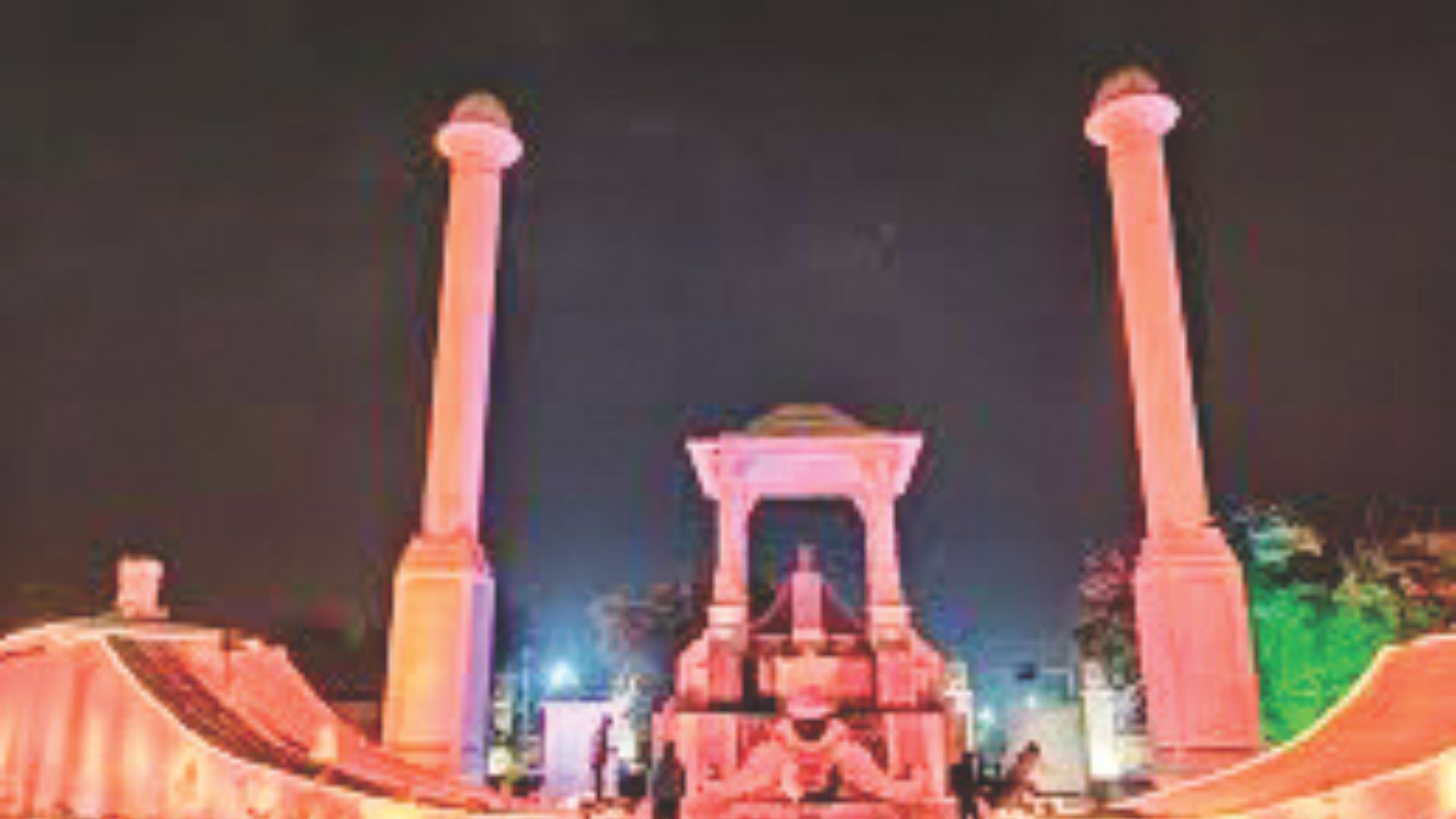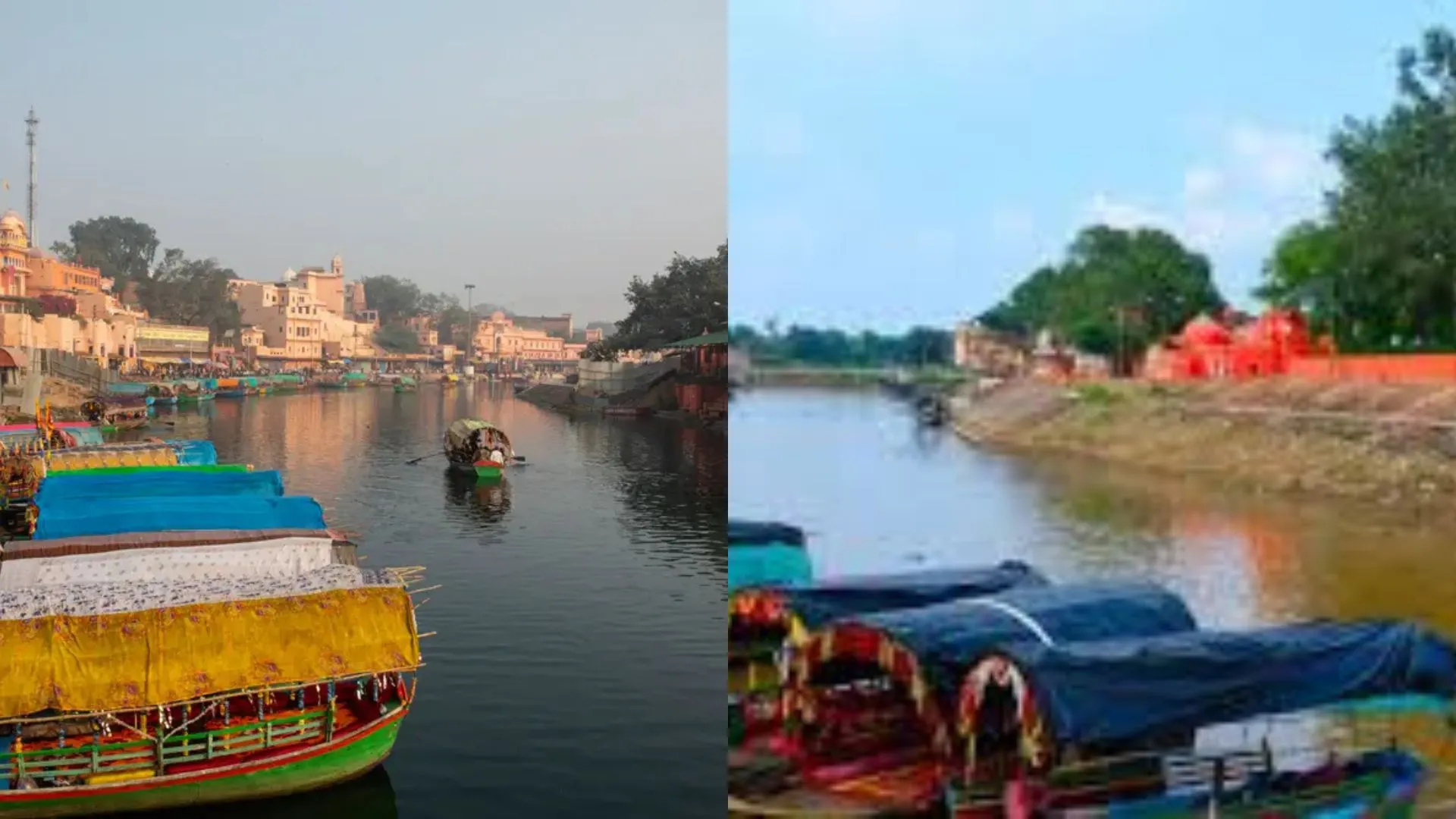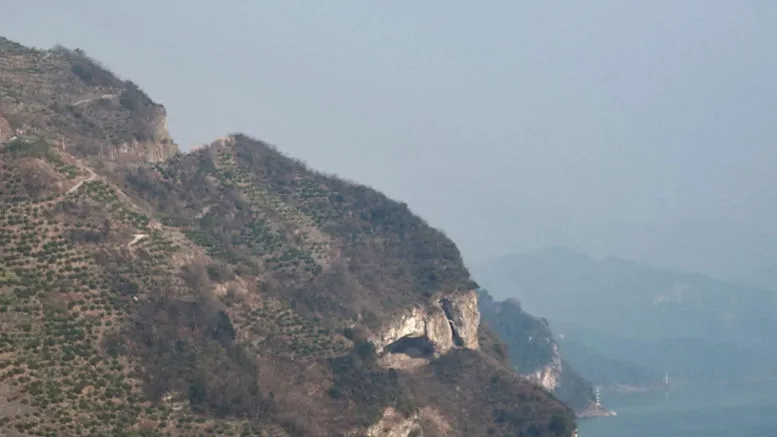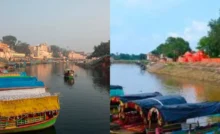Amar Jawan Jyoti is a memorial dedicated to the martyred soldiers of Rajasthan. It serves as both a powerful symbol of sacrifice and an architectural masterpiece that has become an integral part of the Pink City’s modern heritage.
The Eternal Flame, A Symbol of Sacrifice
At the center of the memorial burns an eternal flame, lit in honor of the brave soldiers who laid down their lives for the nation. This never extinguishing flame, housed within a black marble structure, represents the undying spirit of India’s armed forces and the perpetual gratitude of its citizens. The flame continues to burn day and night, through sunshine and storm, symbolizing the eternal nature of their sacrifice.
Architectural Brilliance
Rising majestically from the center of Jaipur’s famous Albert Hall Museum circle, the Amar Jawan Jyoti showcases a perfect blend of modern architecture with traditional Rajasthani elements. The monument’s design incorporates four pillars reaching skyward, representing the four directions and suggesting that the sacrifice of soldiers protects the nation from all sides. The structure stands 40 feet tall, its white marble gleaming against the Jaipur sky. The base features intricate carvings depicting scenes from India’s military history and symbols of valor. The use of both black and white marble creates a striking visual contrast, enhanced by the careful architectural lighting that illuminates the monument at night.
Historical Significance
Inaugurated in 1972, the Amar Jawan Jyoti of Jaipur holds special significance as one of the earliest war memorials constructed in independent India. The monument commemorates not only the soldiers who fell during India’s wars for independence but also those who have sacrificed their lives in subsequent conflicts, including the Indo Pakistan wars and other military operations.
The Central Structure
The central structure houses the eternal flame within a specially designed enclosure that protects it from the elements while keeping it visible to visitors. The flame is surrounded by four smaller marble structures, each bearing inscriptions in Hindi and English that detail the purpose of the memorial and honor the fallen.
The Surrounding Gardens
The memorial is surrounded by carefully maintained gardens that provide a peaceful setting for reflection. These gardens feature indigenous plants and trees, creating a green oasis in the urban landscape. The landscaping follows traditional Rajasthani garden design principles while incorporating modern elements.
The Ceremonial Area
A large paved area surrounds the central monument, providing space for ceremonial functions and allowing visitors to circumambulate the memorial. This area is particularly significant during important national celebrations and commemorative events.
Daily Rituals
Every evening, a solemn ceremony takes place as the monument is illuminated. The lighting ceremony has become a daily ritual that draws both locals and tourists, creating a moment of collective remembrance and respect.
Special Occasions
The memorial becomes a focal point of city wide celebrations during national holidays such as Republic Day and Independence Day. Military personnel, government officials, and citizens gather here to pay their respects and participate in wreath laying ceremonies.
Best Time to Visit
The memorial is accessible throughout the year, but the most impressive views come during the evening hours when the eternal flame contrasts beautifully with the illuminated structure. Early mornings offer a peaceful atmosphere for those seeking quiet reflection.
Photography Opportunities
The monument presents excellent photography opportunities, particularly during the golden hour and after dark. The interplay of light and shadow on the white marble creates stunning visual effects, while the eternal flame provides a powerful focal point for photographs.
Historical Learning
The memorial serves as an important educational site, particularly for young visitors. Information panels around the complex provide details about India’s military history and the significance of various symbols incorporated into the memorial’s design.
Military Heritage
The site offers insights into Rajasthan’s rich military heritage and the contribution of its soldiers to national defense. The memorial complex includes displays about notable military campaigns and heroes from the region.
Preservation Efforts
Dedicated teams work round the clock to maintain the eternal flame and preserve the memorial’s structural integrity. Regular cleaning and maintenance ensure that the white marble retains its pristine appearance despite Jaipur’s dusty climate.
Modern Additions
Recent years have seen careful additions to enhance the visitor experience, including improved lighting systems and information displays, while maintaining the memorial’s solemn character.
Local Pride
The Amar Jawan Jyoti has become a source of immense pride for Jaipur’s residents, representing their city’s contribution to national defense and patriotism. Local schools regularly organize visits to the memorial to instill values of service and sacrifice in young students.
Tourist Attraction
While primarily a memorial, the site has also become an important stop on Jaipur’s tourist circuit, attracting visitors interested in both its architectural beauty and historical significance.
Location and Access
Located in the heart of Jaipur, the memorial is easily accessible from all parts of the city. Its central location near the Albert Hall Museum makes it convenient to combine with visits to other nearby attractions.
Visiting Hours
The memorial is open to visitors throughout the day, with special viewing opportunities during the evening lighting ceremony. No entry fee is charged, making it accessible to all.
Etiquette
Visitors are expected to maintain appropriate decorum, keeping in mind the memorial’s solemn purpose. Photography is permitted, but visitors should be respectful and avoid disturbing others paying their respects.
Legacy and Future
The Amar Jawan Jyoti continues to evolve as a living memorial, adapting to changing times while maintaining its core purpose of honoring military sacrifices. Recent initiatives focus on digital documentation of the memorial’s history and the stories of the soldiers it commemorates.
Plans for the future include the development of an interpretation center near the memorial to provide more detailed information about India’s military history and the role of Rajasthani soldiers in various campaigns.
As Jaipur grows and changes, the Amar Jawan Jyoti remains a constant reminder of the price of freedom and the value of sacrifice. It stands not only as a memorial to the past but as a beacon of inspiration for future generations, embodying the spirit of service and dedication to the nation that characterizes India’s armed forces.
This eternal flame continues to illuminate not just the physical space it occupies but also the hearts and minds of all who visit, serving as a powerful reminder of the courage and sacrifice that protect our freedoms and way of life.
Architectural Symbolism and Details
The architectural elements of Amar Jawan Jyoti carry deep symbolic meaning beyond their aesthetic appeal. The four pillars, while representing the cardinal directions, also symbolize the four arms of India’s military services: Army, Navy, Air Force, and Coast Guard. The height of the structure, at precisely 40 feet, was chosen to represent the four decades of India’s independence at the time of the memorial’s construction.
The marble used in construction was carefully selected from Makrana quarries, the same source that provided marble for the Taj Mahal. The black marble housing the eternal flame comes from Kishangarh, creating a connection with Rajasthan’s mineral heritage. Master craftsmen from across Rajasthan contributed to the intricate carving work, incorporating traditional motifs alongside military symbols.
Educational Programs
Local schools have developed specialized curriculum modules centered around visits to Amar Jawan Jyoti. These programs combine history lessons with values education, helping students understand the significance of national service and sacrifice. Regular interactions with veterans are organized at the memorial, allowing young people to hear firsthand accounts of military service.
Cultural Events
The memorial grounds host carefully curated cultural events that align with its dignified character. These include military band performances during special occasions, poetry recitations dedicated to fallen soldiers, art exhibitions featuring military themes, and documentary screenings about India’s military history.
The memorial’s designers paid special attention to environmental sustainability. The surrounding gardens feature drought-resistant local plants, demonstrating water-conscious landscaping practices. Solar panels discreetly installed nearby help power the evening illumination, making the memorial increasingly energy-efficient.










